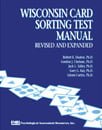
Wisconsin Card Sorting Test wcst
For: Assess perseveration and abstract reasoning in ages 6.5 -89 years
Reading Level: Child - Adult
Format: Paper-and-Pencil
Length: 20-30 minutes
Scoring: Hand Scored
Online Forms, Reports, Kits & e-Manuals
Click to browse products
Printed Forms & Handscoring Materials
Test forms, response booklets and scoring reference manuals.
Printed Kits
Click to browse products
WCST e-Manual
WCST/WCST-64 online Score Report (each) min order 5
WCST/WCST-64 online i-Admin (each) min order 5
WCST Manual, Revised and Expanded
WCST Record Booklets (25)
WCST Introductory Kit
Author
David A. Grant, PhD and Esta A. Berg, PhD
Description
Although the WCST is used primarily to assess perseveration and abstract thinking, it has gained increasing popularity as a neuropsychological instrument. It has been considered a measure of executive function because of its reported sensitivity to frontal lobe dysfunction. As such, the WCST allows the clinician to assess the following “frontal” lobe functions: strategic planning, organised searching, utilising environmental feedback to shift cognitive sets, directing behaviour toward achieving a goal, and modulating impulsive responding.
Designed for individuals ages 6.5-89 years.
Has shown specific sensitivity to brain lesions involving frontal lobes.
Can be considered a measure of executive function, requiring the ability to develop and maintain an appropriate problem-solving strategy across changing stimulus conditions in order to achieve a future goal.
Provides objective scores not only of overall success, but also for specific sources of difficulty on the task (e.g., inefficient initial conceptualisation, perseveration, failure to maintain a cognitive set, and inefficient learning across stages of the test).
The four stimulus cards incorporate three stimulus parameters.
The stimulus cards and response cards use the systematic figure configurations originally developed and introduced in 1948 by David A. Grant, PhD, and Esta A. Berg, PhD.
Raw score to normalised standard, percentile and T score conversion.
Normative data derived from 899 normal children, adolescents and adults.
Case illustrations aid in scoring and interpretation.
Administration and Scoring
The response cards are numbered from 1 to 64 on the lower left corner of the reverse side to ensure a standard order of presentation.
Respondents are required to sort the cards according to different principles during the test administration.
Clients should have normal or corrected vision and hearing sufficient to adequately comprehend the test instructions and to visually discriminate the stimulus parameters of Colour, Form and Number.
Among clinical populations with known or suspected brain dysfunction, these requirements may not be fully met. In such cases, the reliability and validity of the WCST data will depend on the clinical skill and expertise of the examiner.
Features
Unlike other measures of abstraction, the WCST provides objective measures of overall success and identifies particular sources of difficulty on the task.
When used with more comprehensive ability testing, the WCST is helpful in discriminating frontal from non-frontal lesions.
Related Products
WCST:CV4-Scoring Program
WCST:CV4 Research Edition
NB: Prices are in Australian dollars inclusive of GST. NZ customers need to log in to view ex-GST prices.



